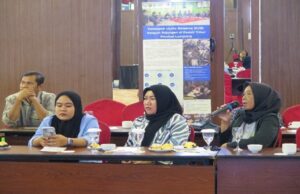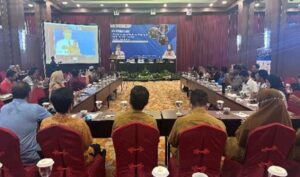By: Onesya Damayanti, M. Khazali, and Meutia Isty
“Fishing with trawl must be stopped because it has increasingly reduced my husbands’ blue swimming crab catches,” Sunamah stated confidently during the Lampung Blue Swimming Crab Co-Management meeting on March 5, 2024, representing women groups. Speaking in an official forum of about 50 participants, predominantly male government officials, was something she had never imagined possible before.
Women like Sunamah have long been integral to blue swimming crab fisheries, working tirelessly and often unrecognized. From preparing and repairing nets for their husbands, sorting and selling crabs catches to middlemen, and managing household finances from crab sales. Yet, their critical contributions have never made it to the decision-making table.
Despite this, these women’s deep knowledge of the crab fishery conditions, including catch landing and the economic impacts of crab price fluctuations, could provide valuable insights for the decision-making process in sustainable fishery management.
Recognizing the critical role of women in enhancing the income streams of fishing households, EDF initiated a program in 2021 to empower women as key actors in sustainable blue swimming crab fisheries management. The journey began with a gender analysis of the crab supply chain, exploring alternative livelihoods like crab shell processing, and providing hands-on training. The goal was to enhance household economies in five villages while strengthening the role of women in fisheries management.
To support women’s strong interest in crab processing and exploring new business enterprise, EDF and a local NGO partner Mitra Bentala helped establish women’s groups in several villages. The first women’s groups were established in 2021 in Muara Gading Mas and Kuala Teladas Villages. Inspired by the success of these initial groups, additional women’s groups were formed in 2023 in Margasari, Cabang, and Sungai Burung Villages. By 2024, a total of 8 women’s groups had been established, bringing together 94 women members from 5 villages.
EDF’s empowerment approach focused on four components: group strengthening, capacity building, alternative livelihoods, and fostering group independence. Collaborating with local partner Mitra Bentala, EDF helped these groups obtain official registration status from the Marine and Fisheries Agency. This legal recognition allows the groups to be formally registered as community organizations, receive official certificates of establishment, propose aids to the government, and participate in government’s capacity building programs.
Capacity building included training sessions and cross-group learning exchanges. To improve alternative livelihoods, the program focused on training to turn crab shell waste into valuable food products like crackers and cookies, encouraging women’s groups to launch small-scale production businesses, and connect their products to larger markets.
A critical moment came in 2022 when women were first included in the sustainable blue swimming crab co-management team due to growing recognition of their vital role in crab industry. In 2023, the Governor of Lampung issued Decree No. 554, officially recognizing women’s groups as members of the provincial fishery management team. For the first time, women had a seat at the table, having voting rights on the blue swimming crab management and its economic development strategies.

Women Representatives spoke at the Blue Swimming Crab Co-Management Team meeting. Photo: Meutia Isty/EDF
Sunamah and the women who confidently spoke up in the sustainable blue swimming crab co-management team institutional meeting are the result of transformative work of EDF and the growing capacities of women in Lampung’s fishing communities. Through a series of training programs, workshops, and mentorship initiatives, these women have developed leadership and organizational skills, empowering them to actively participate in decision-making processes. Additionally, regular group meetings and provincial-level activities allow them to share experiences and knowledge, further boosting their confidence to voice their concerns about sustainable crab fishery management in Lampung.
Similarly, during a provincial meeting, Suwati, another women’s group leader, expressed a hope: “We are grateful for EDF’s support, and we hope that government agencies will continue to involve us in activities that can improve our livelihoods.”
The room, filled with provincial and district officials, represented more than just another meeting. It was a critical moment where women who had long been silent are now taking active roles in blue swimming crab management. With continued support, the independence of these women’s groups can be achieved through local government programs, ensuring long-term benefits for the environment and the fishing communities that depend on it.










